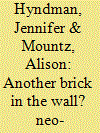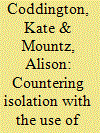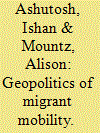|
|
|
Sort Order |
|
|
|
Items / Page
|
|
|
|
|
|
|
| Srl | Item |
| 1 |
ID:
081372


|
|
|
|
|
| Publication |
2008.
|
| Summary/Abstract |
Insecurity and fear in the global North produce political space to advance security measures, including the externalization of asylum. States in the global North make it increasingly difficult for asylum seekers to reach sovereign territory where they might make a refugee claim. While legal protection remains intact under the Refugee Convention, extra-legal measures employ geography to restrict access to asylum and keep claimants at bay through a variety of tactics. This article probes the ways in which fear of uninvited asylum seekers is securitized and looks at the tactics utilized to keep them at bay, far from the borders of states that are signatories to the UN Refugee Convention. Drawing on research in Europe and Australia, we demonstrate how states are promoting 'protection in regions of origin' through practices of de facto neo-refoulement. Neo-refoulement refers to a geographically based strategy of preventing asylum by restricting access to territories that, in principle, provide protection to refugees
|
|
|
|
|
|
|
|
|
|
|
|
|
|
|
|
| 2 |
ID:
130877


|
|
|
|
|
| Publication |
2014.
|
| Summary/Abstract |
Governments detain asylum seekers on islands across the Indian Ocean region, including Australia's Christmas Island, Papua New Guinea's Manus Island, Nauru, and across the Indonesian archipelago. Scholars and advocates alike have shown that the ambiguous jurisdiction and complex legal migration statuses that emerge in these areas, as well as their remote location and isolation, contribute to their popularity as sites of migrant detention. The negative effects of isolation and remoteness on migrants' physical and mental health, as well as their legal outcomes, have been well documented. We argue, however, that detainees and others are countering the effects of isolation with the use of technology. Ethnographic research conducted on the islands within Australian and Indonesian migrant detention networks suggests that asylum seekers detained in remote sites across the region are combating the isolation of detention with the use of mobile phones, internet access, and social media networks. They communicate with friends, relatives, legal representatives, advocates, activists, and members of the public beyond prison walls to transmit information, facilitate advocacy inside and outside of detention facilities, and construct transnational support networks. In turn, punitive policies to discipline asylum seekers by limiting methods of communication threaten these efforts.
|
|
|
|
|
|
|
|
|
|
|
|
|
|
|
|
| 3 |
ID:
113520


|
|
|
|
|
| Publication |
2012.
|
| Summary/Abstract |
This paper highlights how states attempt to control migrant mobilities through refugee claims. We examine the representations and practices of refugees in the refugee claimant process over time and in very different cases with distinct geopolitical influences and inflections in Canada. Our paper is based on case studies of Sri Lankan Tamil migrants in Toronto and refugee claimants from Fujian province, China, that landed in British Columbia in 1999. We analyse the ways that geopolitics influence every phase of the refugee claimant process, from the representations of claimants, to the decisions made about refugee claims, and the tenor of mundane encounters with state authorities. Our findings indicate that the geopolitics of migrant mobilities are produced through everyday state practices as well as by migrant strategies to move and resettle.
|
|
|
|
|
|
|
|
|
|
|
|
|
|
|
|
| 4 |
ID:
175322


|
|
|
|
|
| Summary/Abstract |
Well before the COVID-19 pandemic, the United States might have been described as a country collapsing in on itself, defined by deep chasms in wealth and political ideologies. While divisions and inequalities pre-existed the Trump presidency, the rise of support for nationalism has only grown. This nationalism has been bolstered by an unexamined notion of American exceptionalism and militant individualism.
|
|
|
|
|
|
|
|
|
|
|
|
|
|
|
|
|
|
|
|
|